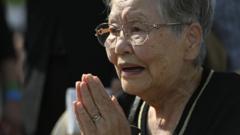At 08:15 on August 6, 1945, a nuclear bomb was unleashed on Hiroshima, forever altering the lives of countless individuals, including Lee Jung-soon, an 88-year-old survivor now living in Hapcheon, South Korea. On that fateful morning, as Lee was heading to school, her father rushed home, urging immediate evacuation. "They say the streets were filled with the dead – but I was so shocked all I remember is crying," she recalls, the horrific memories still vivid.
The atomic bomb, known as 'Little Boy', resulted in the immediate deaths of around 70,000 people, with tens of thousands more succumbing to radiation and injuries. While much focus has been placed on the bomb's overall impact, the circumstances of approximately 20% of the immediate victims—Korean nationals—remain lesser-known. At the time, around 140,000 Koreans resided in Hiroshima, many there as a result of forced labor during Japan's colonial rule.
Survivors like Shim Jin-tae and Lee carry the weight of their experiences, facing both physical and societal consequences. Shim, now 83, expresses his anguish: "No-one takes responsibility... America never apologized. Japan pretends not to know." Their stories reveal a continuing struggle not only with disfigurement and chronic illnesses, but also a fight for justice that remains unresolved.
Hapcheon, where many survivors sought refuge, is known as "Korea's Hiroshima". The community bears testimony to the long-lasting ramifications of that tragic day. Lee Jung-soon, suffering from skin cancer and other ailments, grapples with the health issues stemming from her exposure to radiation. Her son, Ho-chang Lee, awaits a kidney transplant, a health issue he believes is linked to their tragic past. The Ministry of Health and Welfare in South Korea is currently researching genetic data of survivors but with unclear results for future recognition.
The high death toll among Koreans due to the bombing can be attributed to harsh working conditions, systemic discrimination, and limited access to medical care in the aftermath. While many survivors returned to Korea after the war, they faced prejudice and stigma. “Survival came before pride,” recounts Shim, recalling how fellow survivors were ostracized for their injuries and appearance.
Despite being victims of historical atrocities, generations of Koreans have been overlooked. Second-generation survivors like Han Jeong-sun share the torment of unrecognized suffering. "My illness is the proof. My son's disability is the proof," she states in frustration, remarking on the pervasive lack of acknowledgment from authorities.
The silence surrounding their ordeal was not broken until 2019, when the Ministry released an initial report recognizing their suffering. However, the formal acknowledgment and compensatory efforts still lag behind, as future studies plan to consider second and third-generation survivors only if results yield statistical significance.
Recent visits by Japanese officials to memorials in Hapcheon have yet to bridge the gaps of accountability, as many Koreans perceive Japan's apologies as inadequate. Advocacy for the recognition of these survivors' stories continues, with activists stressing the importance of acknowledging historical injustices. "Memory matters more than compensation," Shim asserts, emphasizing the need to share their stories before it is too late. The fight for acknowledgment persists, shaping the legacy of those impacted by one of history's most devastating moments.





















